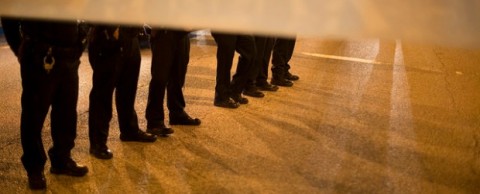Don't shoot
The police shooting of Michael Brown in Ferguson, Missouri, revealed a stark racial and social divide: millions of African Americans can easily imagine themselves or a loved one as the unarmed person being fired upon by police, whereas few whites can. That reality is finally more significant than the ambiguous details of what happened in Brown’s fatal 90-second encounter with police officer Darren Wilson. For black Americans, the abuse of power by police is a familiar pattern, not an aberration—and it is that reality that must be acknowledged and addressed.
In one of many powerful confessions evoked by the shooting, Jonathan Capehart of the Washington Post recalled how his mother used to tell him “not to run in public, lest I arouse undue suspicion. How I most definitely should not run with anything in my hands, lest anyone think I stole something. The lesson included not talking back to the police, lest you give them a reason to take you to jail—or worse. And I was taught to never, ever leave home without identification.” What white children are given such instructions?
According to one poll, 45 percent of African Americans believe they have been discriminated against by the police because of their race, compared to only 7 percent of whites. Blacks are in fact much more likely to be arrested for drug use, for example, than are whites found engaged in the same activities. Even 31 percent of whites, the poll found, believe that police are more likely to use deadly force against blacks. The tensions created by such disparities are exacerbated when—as is the case in Ferguson and many cities—the police force is overwhelmingly white and the population predominantly black.






